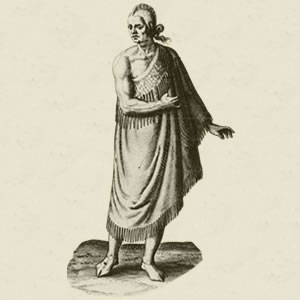Roanoke - Introduction

In his short section on Roanoke in The American Indian in Western Legal Thought: The Discourses of Conquest (174-85), Robert A. Williams, Jr., calls Sir Walter Raleigh's enterprise the "Second Elizabethan Crusade to America." Though comprised of two attempts in the late 1580s, Roanoke was not successful and lives in our history mainly through the mystery of the "Lost Colony" and the charming aura around the birth of Virginia Dare, the first English child born in America.
But Williams calls Raleigh "the first great orchestrator of Elizabethan-era colonizing discourse" (176), and Roanoke is remarkable for generating Richard Hakluyt's Discourse of Western Planting (1584), a landmark promotion and justification document, and Thomas Hariot's A Briefe and True Report of the Newfound Land of Virginia (1588), a first-person account by a scientist valuably enriched later with Theodore de Bry's engravings of watercolors by John White.
Of Hakluyt's work, Williams says that "despite its appearance as a rummaging scramble for any and all legitimating arguments for English colonization, Hakluyt's text points toward the secularized trajectory" of English colonizing discourse as it moved toward a "desacralized mercantilist ideology" (180). And Williams calls Hariot's work "some of the best European-generated anthropological material" about a people whom he thought could be brought to civility and conversion in a short time (182).
This Roanoke section of our Literature of Justification project was completed by Elizabeth Wambold in spring 2004. We hope that other students and faculty, even beyond Lehigh University, will build on her work, so we welcome suggestions, corrections, questions, and, especially, appropriate contributions of all types from bibliographical entries through full essays.
Contact Professor Edward J. Gallagher, Department of English, Lehigh University via e-mail at ejg1@lehigh.edu.

